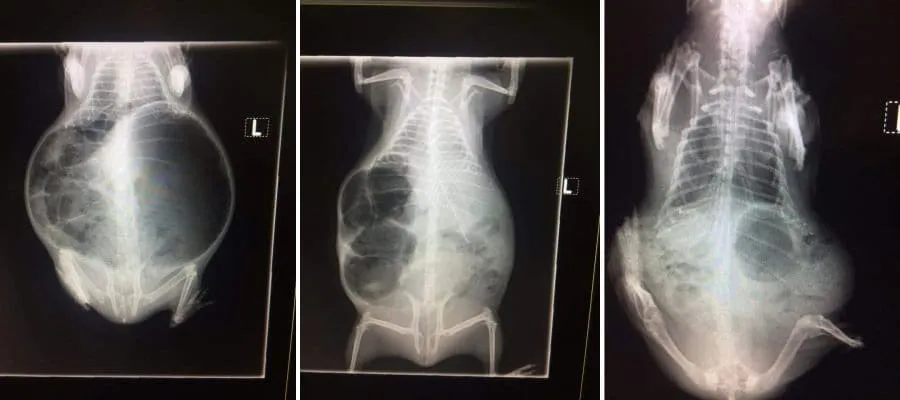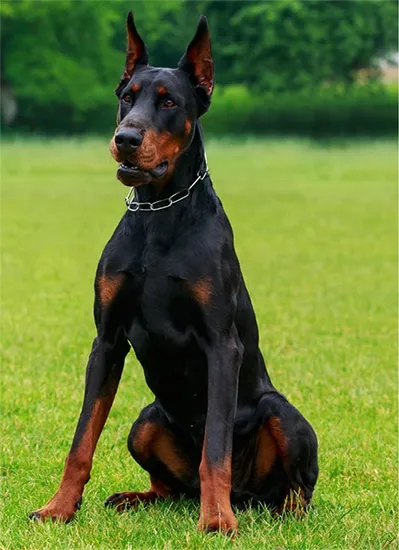Gastric Dilatation and Volvulus (GDV), commonly known as bloat, stomach torsion, or twisted stomach, is a severe and potentially fatal condition that can affect dogs. This emergency requires immediate veterinary attention to prevent serious complications or death. This article delves into what GDV is, its causes, the signs to watch for, treatment options, and preventive measures.
What Exactly is GDV in Dogs?
GDV occurs when a dog’s stomach fills with gas, fluid, or food, causing it to distend and swell. This distension can lead to the stomach twisting on its axis, a phenomenon called volvulus. This twist obstructs the flow of blood to vital organs, including the stomach itself and the spleen, and can also impede breathing due to pressure on the chest cavity. Dogs experiencing GDV can rapidly enter shock.
Identifying the Causes of Twisted Stomach
While the precise trigger for GDV remains elusive, several factors are known to increase a dog’s risk:
- Ingestion of bones: These can obstruct the stomach’s outflow, trapping gas and food.
- Foreign body obstruction: Swallowing non-food items like toys or corn cobs can cause blockages.
- Eating habits: Having one large meal per day, eating too quickly, or consuming excessive amounts of food or water can contribute.
- Exercise timing: Engaging in strenuous exercise soon after eating is a known risk factor.
- Genetic predisposition: Certain breeds are genetically more susceptible.
Ongoing research is exploring the physiological mechanisms behind GDV to better understand and prevent it.
Which Dogs Are Predisposed to GDV?
While any dog can develop GDV, it is significantly more common in large breeds with deep, narrow chests, such as Great Danes, German Shepherds, Weimaraners, and Dobermans. Although rare, it can occur in smaller breeds. Interestingly, male dogs are twice as likely to develop GDV as females, and older dogs (over seven years) are more than twice as likely to be affected compared to younger adults. Even non-canine pets, like guinea pigs, have been treated for bloat.
 X-rays of a guinea pig showing bloat resolving after treatment
X-rays of a guinea pig showing bloat resolving after treatment
Recognizing the Signs and Symptoms of GDV
Several indicators can signal that a dog may be suffering from GDV. Some are more apparent than others:
- Abdominal distention: A visibly swollen or enlarged stomach.
- ‘Ping’ sound: Tapping the swollen abdomen may produce a hollow, drum-like sound.
- Non-productive vomiting or retching: The dog appears to be trying to vomit, but little or nothing comes up, often accompanied by white froth.
- Lethargy: A noticeable lack of energy or responsiveness.
Other concerning signs include agitation, discomfort, abdominal pain, difficulty breathing, excessive salivation, a weak pulse, rapid heart rate, pale gums, shock, and collapse. Bloat is a critical emergency, and without prompt treatment, it can be fatal within an hour. However, with early intervention, over 80% of dogs can survive. It’s important to note that other serious conditions, such as pregnancy, cancer, or infections, can also cause abdominal distention and require immediate veterinary care.
 Black and brown Doberman Pinscher sitting on grass, a breed predisposed to GDV
Black and brown Doberman Pinscher sitting on grass, a breed predisposed to GDV
Treatment Options for GDV
Upon arrival at a veterinary clinic or emergency hospital, the first step in treating GDV is an assessment, often including radiographs (X-rays), to determine if the stomach is simply dilated or also twisted. If a twist is confirmed, emergency surgery is the only viable treatment.
Because dogs with GDV are in shock or at high risk of entering shock, intravenous fluids are administered immediately. Pain relief is also crucial due to the severe discomfort associated with the condition. To alleviate pressure within the stomach, a veterinarian may pass a stomach tube or insert a large needle to release accumulated gas, which helps improve blood flow and stabilize the patient before surgery.
The surgery itself is complex and requires a skilled surgical team and close anesthetic monitoring. During the procedure, the stomach is untwisted, and surrounding organs like the spleen are examined for damage. A gastropexy is typically performed, where the stomach is surgically attached to the abdominal wall to prevent future twisting.
Post-operative care is intensive, involving several days of close monitoring for signs of infection, cardiac abnormalities, ulcers, or damage to the pancreas or liver. Antibiotics and other medications may be necessary. Some dogs may develop disseminated intravascular coagulation (DIC), a life-threatening bleeding disorder requiring specialized intensive care. Heart rate and rhythm are monitored closely, as arrhythmias can occur.
Preventing GDV in Dogs
While not all cases can be prevented, several strategies can significantly reduce the risk of GDV:
- Feeding Schedule: Feed your dog two or more small meals daily instead of one large one.
- Water Intake: Limit water intake immediately after a large meal to prevent excessive stomach expansion.
- Exercise Management: Avoid vigorous exercise, excitement, or stress for at least an hour before and after meals.
- Slow Feeding Bowls: Utilize specialized bowls designed to slow down a dog’s eating pace.
- Dietary Changes: Introduce any diet changes gradually over three to five days to allow the gut bacteria to adjust, minimizing gas production.
- Bone Consumption: Avoid feeding bones or monitor them very closely.
- Preventative Surgery: For breeds with a high risk of GDV, a gastropexy can be performed concurrently with spaying or neutering. This preventative surgery has been shown to reduce the risk of bloat by over 90%.
If you have concerns about GDV or your dog’s risk factors, consult your local veterinarian for a health check-up and discuss preventive options. For immediate emergencies, visit your closest Animal Emergency Service hospital or your local vet without delay.
 Weimaraner puppy on a beach, a breed predisposed to GDV in dogs
Weimaraner puppy on a beach, a breed predisposed to GDV in dogs
If your pet is experiencing symptoms suggestive of a urinary tract infection, it is crucial to seek veterinary advice. Understanding the symptoms of a UTI in a male dog can help you identify potential issues. Likewise, recognizing the general signs my male dog has a UTI is vital for prompt diagnosis. Be aware of the various symptoms for urinary tract infection in dogs, as early detection is key. If you suspect your pet has a UTI, knowing the signs a female dog has a UTI is also important for comprehensive awareness. Prompt veterinary attention is essential for any suspected signs of your dog having a UTI.
